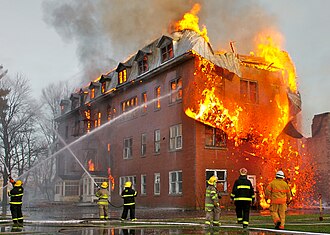Firefighting
Firefighting is the act of extinguishing fires. A firefighter suppresses and extinguishes fires to prevent loss of life and property. It is a dangerous profession requiring specialized training, equipment, and skills.




History[edit]
The history of organized firefighting began in ancient Rome while under the rule of Augustus. Rome created a fire department consisting of about 7,000 paid firefighters. These firefighters responded to and fought fires using bucket chains, pumps, and poles.
Firefighting methods[edit]
Firefighting consists of removing one or more of the three elements essential to combustion- fuel, heat, and oxygen (known as the fire triangle). The most common method is to use water to remove heat. Other methods include isolating the fire, suppressing the fire by foam or other suppressive agents, and ventilating the fire to remove smoke and heat.
Firefighting equipment[edit]
Firefighters use a variety of equipment depending on the nature of the fire, but some of the standard gear includes a helmet, self-contained breathing apparatus, bunker gear, PASS device, thermal imaging camera, and a fire hose.
Firefighting worldwide[edit]
Firefighting services vary around the world, but there are three main types of firefighting: municipal, industrial, and wildland. Municipal firefighters protect towns and cities. Industrial firefighters are found in large establishments such as airports or manufacturing companies. Wildland firefighters deal with fires in forests and grasslands.
Firefighter training[edit]
Firefighter training varies by country, state, and even city. In the United States, the National Fire Protection Association sets the standards for firefighter training. Training includes learning about fire behavior, building construction, emergency medical procedures, hazardous materials, and fire prevention.
Firefighting images[edit]
-
Firefighter ladder slide
-
DOD mobile aircraft firefighting training device
-
2-11 fire in Humboldt Park, Chicago
See also[edit]
Ad. Transform your life with W8MD's Budget GLP-1 injections from $75


W8MD offers a medical weight loss program to lose weight in Philadelphia. Our physician-supervised medical weight loss provides:
- Weight loss injections in NYC (generic and brand names):
- Zepbound / Mounjaro, Wegovy / Ozempic, Saxenda
- Most insurances accepted or discounted self-pay rates. We will obtain insurance prior authorizations if needed.
- Generic GLP1 weight loss injections from $75 for the starting dose.
- Also offer prescription weight loss medications including Phentermine, Qsymia, Diethylpropion, Contrave etc.
NYC weight loss doctor appointmentsNYC weight loss doctor appointments
Start your NYC weight loss journey today at our NYC medical weight loss and Philadelphia medical weight loss clinics.
- Call 718-946-5500 to lose weight in NYC or for medical weight loss in Philadelphia 215-676-2334.
- Tags:NYC medical weight loss, Philadelphia lose weight Zepbound NYC, Budget GLP1 weight loss injections, Wegovy Philadelphia, Wegovy NYC, Philadelphia medical weight loss, Brookly weight loss and Wegovy NYC
|
WikiMD's Wellness Encyclopedia |
| Let Food Be Thy Medicine Medicine Thy Food - Hippocrates |
Medical Disclaimer: WikiMD is not a substitute for professional medical advice. The information on WikiMD is provided as an information resource only, may be incorrect, outdated or misleading, and is not to be used or relied on for any diagnostic or treatment purposes. Please consult your health care provider before making any healthcare decisions or for guidance about a specific medical condition. WikiMD expressly disclaims responsibility, and shall have no liability, for any damages, loss, injury, or liability whatsoever suffered as a result of your reliance on the information contained in this site. By visiting this site you agree to the foregoing terms and conditions, which may from time to time be changed or supplemented by WikiMD. If you do not agree to the foregoing terms and conditions, you should not enter or use this site. See full disclaimer.
Credits:Most images are courtesy of Wikimedia commons, and templates, categories Wikipedia, licensed under CC BY SA or similar.
Translate this page: - East Asian
中文,
日本,
한국어,
South Asian
हिन्दी,
தமிழ்,
తెలుగు,
Urdu,
ಕನ್ನಡ,
Southeast Asian
Indonesian,
Vietnamese,
Thai,
မြန်မာဘာသာ,
বাংলা
European
español,
Deutsch,
français,
Greek,
português do Brasil,
polski,
română,
русский,
Nederlands,
norsk,
svenska,
suomi,
Italian
Middle Eastern & African
عربى,
Turkish,
Persian,
Hebrew,
Afrikaans,
isiZulu,
Kiswahili,
Other
Bulgarian,
Hungarian,
Czech,
Swedish,
മലയാളം,
मराठी,
ਪੰਜਾਬੀ,
ગુજરાતી,
Portuguese,
Ukrainian



